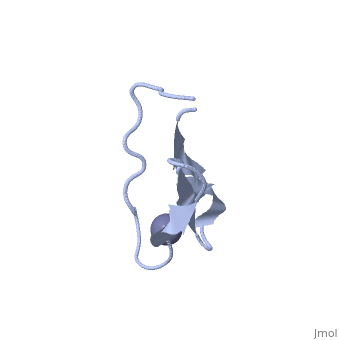1dfe: Difference between revisions
New page: left|200px<br /><applet load="1dfe" size="450" color="white" frame="true" align="right" spinBox="true" caption="1dfe" /> '''NMR STRUCTURE OF RIBOSOMAL PROTEIN L36 FROM ... |
No edit summary |
||
| Line 1: | Line 1: | ||
[[Image:1dfe.gif|left|200px]]<br /><applet load="1dfe" size=" | [[Image:1dfe.gif|left|200px]]<br /><applet load="1dfe" size="350" color="white" frame="true" align="right" spinBox="true" | ||
caption="1dfe" /> | caption="1dfe" /> | ||
'''NMR STRUCTURE OF RIBOSOMAL PROTEIN L36 FROM THERMUS THERMOPHILUS'''<br /> | '''NMR STRUCTURE OF RIBOSOMAL PROTEIN L36 FROM THERMUS THERMOPHILUS'''<br /> | ||
==Overview== | ==Overview== | ||
We have determined the solution NMR structure of the ribosomal protein L36 | We have determined the solution NMR structure of the ribosomal protein L36 from Thermus thermophilus. L36 is the smallest protein in the large subunit of the prokaryotic ribosome. The sequence contains three completely conserved cysteine residues and one conserved histidine residue in a C-X(2)-C-X(12)-C-X(4)-H motif. Extended X-ray absorption fine structure spectroscopy was used to confirm that a purified L36 sample contains an equimolar amount of zinc. The structure of L36 was determined using simulated annealing based on NOE distance restraints, dihedral angle restraints and hydrogen bond distance restraints derived from NMR spectra of (15)N-labeled and non-labeled L36 samples at pH 7 and 12 degrees C, and by imposing tetrahedral zinc ion coordination geometry. The L36 fold is characterized by a triple-stranded antiparallel beta-sheet with the zinc-binding site at one end. The structure of the zinc site is well-determined and shows that the three cysteine sulphur atoms are supported by hydrogen bonds to backbone amide protons. The conserved histidine residue is located in a short 3(10)-helix and coordinates zinc by the N(delta1) atom. The electrostatic surface potential and location of conserved Arg, Lys and His side-chains suggest a large continuous L36-rRNA interaction interface. The folding topology as well as position and conformation of many conserved side-chains in L36 are very similar to those of zinc-ribbon domains found in the archaeal transcription factor TFIIB N terminus and the eukaryal transcription elongation factor hTFIIS C terminus. Given the relative antiquity of the ribosome it is possible that L36 reflects the parent of transcription-related zinc ribbons. | ||
==About this Structure== | ==About this Structure== | ||
1DFE is a [http://en.wikipedia.org/wiki/Single_protein Single protein] structure of sequence from [http://en.wikipedia.org/wiki/Thermus_thermophilus Thermus thermophilus] with ZN as [http://en.wikipedia.org/wiki/ligand ligand]. Full crystallographic information is available from [http:// | 1DFE is a [http://en.wikipedia.org/wiki/Single_protein Single protein] structure of sequence from [http://en.wikipedia.org/wiki/Thermus_thermophilus Thermus thermophilus] with <scene name='pdbligand=ZN:'>ZN</scene> as [http://en.wikipedia.org/wiki/ligand ligand]. Full crystallographic information is available from [http://oca.weizmann.ac.il/oca-bin/ocashort?id=1DFE OCA]. | ||
==Reference== | ==Reference== | ||
| Line 23: | Line 23: | ||
[[Category: zinc binding]] | [[Category: zinc binding]] | ||
''Page seeded by [http:// | ''Page seeded by [http://oca.weizmann.ac.il/oca OCA ] on Thu Feb 21 12:16:05 2008'' | ||
Revision as of 13:16, 21 February 2008
|
NMR STRUCTURE OF RIBOSOMAL PROTEIN L36 FROM THERMUS THERMOPHILUS
OverviewOverview
We have determined the solution NMR structure of the ribosomal protein L36 from Thermus thermophilus. L36 is the smallest protein in the large subunit of the prokaryotic ribosome. The sequence contains three completely conserved cysteine residues and one conserved histidine residue in a C-X(2)-C-X(12)-C-X(4)-H motif. Extended X-ray absorption fine structure spectroscopy was used to confirm that a purified L36 sample contains an equimolar amount of zinc. The structure of L36 was determined using simulated annealing based on NOE distance restraints, dihedral angle restraints and hydrogen bond distance restraints derived from NMR spectra of (15)N-labeled and non-labeled L36 samples at pH 7 and 12 degrees C, and by imposing tetrahedral zinc ion coordination geometry. The L36 fold is characterized by a triple-stranded antiparallel beta-sheet with the zinc-binding site at one end. The structure of the zinc site is well-determined and shows that the three cysteine sulphur atoms are supported by hydrogen bonds to backbone amide protons. The conserved histidine residue is located in a short 3(10)-helix and coordinates zinc by the N(delta1) atom. The electrostatic surface potential and location of conserved Arg, Lys and His side-chains suggest a large continuous L36-rRNA interaction interface. The folding topology as well as position and conformation of many conserved side-chains in L36 are very similar to those of zinc-ribbon domains found in the archaeal transcription factor TFIIB N terminus and the eukaryal transcription elongation factor hTFIIS C terminus. Given the relative antiquity of the ribosome it is possible that L36 reflects the parent of transcription-related zinc ribbons.
About this StructureAbout this Structure
1DFE is a Single protein structure of sequence from Thermus thermophilus with as ligand. Full crystallographic information is available from OCA.
ReferenceReference
The solution structure of ribosomal protein L36 from Thermus thermophilus reveals a zinc-ribbon-like fold., Hard T, Rak A, Allard P, Kloo L, Garber M, J Mol Biol. 2000 Feb 11;296(1):169-80. PMID:10656825
Page seeded by OCA on Thu Feb 21 12:16:05 2008
